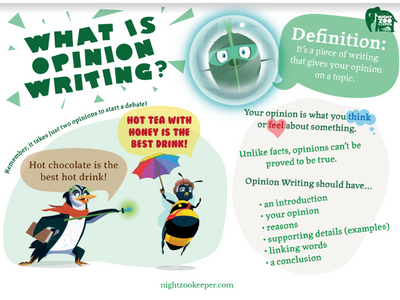Opinion Writing
Free opinion writing guide & worksheets

Home > Worksheets > Writing Styles > Opinion Writing
As children navigate the world around them, they begin to form their own opinions and beliefs. Having the ability to express these thoughts and feelings is very important for their personal development. One way of doing so is opinion writing.
Whether you’re teaching opinion writing or looking for resources to help your child practice this writing style, this page includes lots of free resources to help you along, such as opinion writing prompts, templates, and tips from education experts!

What is opinion writing?
Opinion writing is a type of writing in which the author expresses their thoughts, viewpoints, opinions, or feelings on a topic of their choosing. Opinion articles can be in response to other opinion pieces, or standalone.
Fact vs Opinion
Knowing the difference between facts and opinions helps children think critically about what they read. It teaches them not to trust everything at first glance and understand that writers may have different opinions.
Facts are true statements that can't be proven false. They relate to reality or truth about any subject. Opinions are personal views or beliefs that can't be proven true and often differ among people. Unlike opinions, facts are true for everyone.
Facts are useful in reports because they don't need extra evidence to be true. They can also support opinions in writing. Opinions show personal beliefs or feelings on a topic.
Distinguishing facts and opinions can be tricky. Facts can't be disputed, while opinions often use phrases like “I feel” or “I believe” and adjectives that can't be proven. To tell them apart, see if the statement can be scientifically proven. If not, it's probably an opinion.
Examples of facts and opinions about Night Zookeeper help illustrate these differences:
Facts:
- A few locations in the Night Zoo include The Whispering Woods, Igloo City, and The Campfire of Creativity.
- Night Zookeeper offers various writing options, such as stories, reports, poems, and letters.
Opinions:
- Night Zookeeper has the best reading and writing games!
- My avatar on Night Zookeeper looks so cool!
How to write an opinion piece
The common opinion writing structure is as follows:
- Introduce the topic of the opinion essay using a strong and appropriate sentence starter, such as in my opinion, I believe that, and to me.
- State the opinion clearly, and give supporting reasons for the opinion.
- Use linking words to offer supporting evidence or share a related idea.
- End with a strong conclusion.
Why is it important to pair opinions with reasons?
Writing an opinion piece is not easy. Because opinions vary widely from person to person, opinions are not always agreed with. Additionally, if opinions are not presented in the most convincing way, it’s much easier for readers to misunderstand, disagree with, or dismiss the opinion being presented. In order to avoid these issues, providing reasons for why your child believes a specific view is very important. Without reasons accompanying their opinions, it’s much harder to capture a reader’s attention and convince them to believe your child’s opinion piece!
How to support your opinion with reasons
Once your child has decided on an opinion they'd like to write about, the next step is coming up with reasons to support it. It can sometimes be tricky to come up with support for why you believe something, so we came up with a list of questions your child can ask themselves when they're finding it tricky to come up with reasons to support their opinion:
- Why do you believe/feel/think this way?
- Are there facts you can provide that help support your opinion?
- Are there opinions you have about a related topic that would help support this opinion?
- What details can you provide your reader with so they can understand your opinion better? What will make your opinion more convincing?
- How does your opinion make you feel? Express this.
Example of an opinion with supporting reasons
To make it more clear what an opinion looks like when it has reasons to support it, here’s an example of an opinion about Night Zookeeper:
Opinion: The best game on Night Zookeeper is Underwater Word Hunt.
Reasons: Underwater Word Hunt is the best game in Night Zookeeper because your character gets to ride in a submarine underwater, even if they aren’t a marine animal, which is so cool! Also, you get five lives, which is enough to make mistakes a few times. I’m also not very good at spelling, and this game has helped me learn how to correctly spell so many words, which is why it’s the best!
Even if their readers don’t end up agreeing with your child that Underwater Word Hunt is the best game in Night Zookeeper, they did their best to convince them why they believe this. They provided several different reasons as to why they thought this way, which makes the opinion much stronger than it would have been without any reasons!
Opinion Writing Prompts
There are endless topics to write about when drafting an opinion article. Here are some opinion writing prompts to get your child to share their viewpoints:
- Does pineapple belong on pizza?
- Are dogs better than cats?
- Should recess be longer?
- What is the best cartoon and why?
- Should children be allowed to drive?
- Are aliens real?
- Where is the best place on Earth?
- Should children be required to go to school until they are 18?
- If there could only be one season, which one would you choose and why?
Activity & resource
It’s time to practice all of your child’s new opinion writing skills! Use this free resource to help your child write a great opinion piece.

How Night Zookeeper can help

Looking for further writing guidance for your child? Night Zookeeper is the answer!
Our reading & writing program teaches children about all writing styles in a fantastically fun way. From opinion writing lessons, to creative writing activities, to word games, we have something for even the most reluctant writers! We also provide personalized feedback on every piece of writing submitted.
More Resources
Related Content


Make Reading & Writing Fantastically Fun!
- Award-winning reading & writing program for kids
- Improves spelling, grammar, punctuation & vocabulary
- Over 1,000 different learning games and activities



